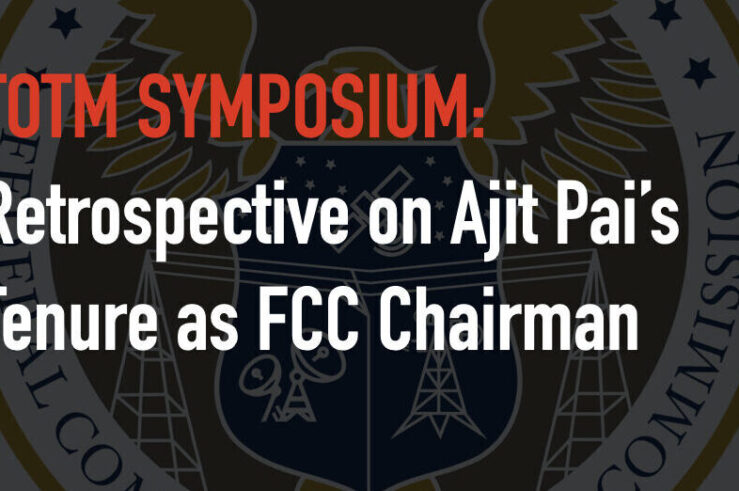Showing results for: “digital markets act”
Does ‘Open Finance’ Promote Competition or Facilitate Free Riding?
Financial technology, or so-called “fintech,” is disrupting the financial sector, and that’s a good thing. Fintech services are making finance more digital and more user-friendly. This, in turn, has led to reduced transactions costs and increased levels of competition, innovation, and financial inclusion. Alas, the emergence of fintech has also been accompanied by a rising ... Does ‘Open Finance’ Promote Competition or Facilitate Free Riding?
Going Back to Antitrust Basics
Advocates of legislative action to “reform” antitrust law have already pointed to the U.S. District Court for the District of Columbia’s dismissal of the state attorneys general’s case and the “conditional” dismissal of the Federal Trade Commission’s case against Facebook as evidence that federal antitrust case law is lax and demands correction. In fact, the ... Going Back to Antitrust Basics
FTC’s Amazon Complaint: Perhaps the Greatest Affront to Consumer and Producer Welfare in Antitrust History
“Seldom in the history of U.S. antitrust law has one case had the potential to do so much good [HARM] for so many people.” – Federal Trade Commission (FTC) Bureau of Competition Deputy Director John Newman, quoted in a Sept. 26 press release announcing the FTC’s lawsuit against Amazon (correction IN ALL CAPS is mine) ... FTC’s Amazon Complaint: Perhaps the Greatest Affront to Consumer and Producer Welfare in Antitrust History
The Mozilla oral arguments and the ongoing hell of the “net neutrality” debate
In the opening seconds of what was surely one of the worst oral arguments in a high-profile case that I have ever heard, Pantelis Michalopoulos, arguing for petitioners against the FCC’s 2018 Restoring Internet Freedom Order (RIFO) expertly captured both why the side he was representing should lose and the overall absurdity of the entire ... The Mozilla oral arguments and the ongoing hell of the “net neutrality” debate
In Defense of Usage-Based Billing
In the face of an unprecedented surge of demand for bandwidth as Americans responded to COVID-19, the nation’s Internet infrastructure delivered for urban and rural users alike. In fact, since the crisis began in March, there has been no appreciable degradation in either the quality or availability of service. That success story is as much ... In Defense of Usage-Based Billing
Innovation-driven market structure in the ag-biotech industry
Dynamic versus static competition Ever since David Teece and coauthors began writing about antitrust and innovation in high-tech industries in the 1980s, we’ve understood that traditional, price-based antitrust analysis is not intrinsically well-suited for assessing merger policy in these markets. For high-tech industries, performance, not price, is paramount — which means that innovation is key: ... Innovation-driven market structure in the ag-biotech industry
Everything is amazing — and no one at the European Commission is happy
Since the European Commission (EC) announced its first inquiry into Google’s business practices in 2010, the company has been the subject of lengthy investigations by courts and competition agencies around the globe. Regulatory authorities in the United States, France, the United Kingdom, Canada, Brazil, and South Korea have all opened and rejected similar antitrust claims. ... Everything is amazing — and no one at the European Commission is happy
The Dangerous Implications of Changing Antitrust Presumptions
One of the key recommendations of the House Judiciary Committee’s antitrust report which seems to have bipartisan support (see Rep. Buck’s report) is shifting evidentiary burdens of proof to defendants with “monopoly power.” These recommended changes are aimed at helping antitrust enforcers and private plaintiffs “win” more. The result may well be more convictions, more ... The Dangerous Implications of Changing Antitrust Presumptions
Rolled by Rewheel, Redux
The Finnish consultancy Rewheel periodically issues reports using mobile wireless pricing information to make claims about which countries’ markets are competitive and which are not. For example, Rewheel claims Canada and Greece have the “least competitive monthly prices” while the United Kingdom and Finland have the most competitive. Rewheel often claims that the number of ... Rolled by Rewheel, Redux
Mergers, innovation, and agricultural biotechnology: Putting the squeeze on growers and consumers?
Innovation Competition in the Spotlight Innovation is more and more in the spotlight as questions grow about concentration and declining competition in the U.S. economy. These questions come not only from advocates for more vigorous competition enforcement but also, increasingly, from those who adhere to the school of thought that consolidation tends to generate procompetitive ... Mergers, innovation, and agricultural biotechnology: Putting the squeeze on growers and consumers?
Unpacking the Flawed 2021 Draft USPTO, NIST, & DOJ Policy Statement on Standard-Essential Patents (SEPs)
Responding to a new draft policy statement from the U.S. Patent & Trademark Office (USPTO), the National Institute of Standards and Technology (NIST), and the U.S. Department of Justice, Antitrust Division (DOJ) regarding remedies for infringement of standard-essential patents (SEPs), a group of 19 distinguished law, economics, and business scholars convened by the International Center ... Unpacking the Flawed 2021 Draft USPTO, NIST, & DOJ Policy Statement on Standard-Essential Patents (SEPs)
Chairman Pai’s Legacy of Transparency
For many, the chairmanship of Ajit Pai is notable for its many headline-grabbing substantive achievements, including the Restoring Internet Freedom order, 5G deployment, and rural buildout—many of which have been or will be discussed in this symposium. But that conversation is incomplete without also acknowledging Pai’s careful attention to the basic blocking and tackling of ... Chairman Pai’s Legacy of Transparency









